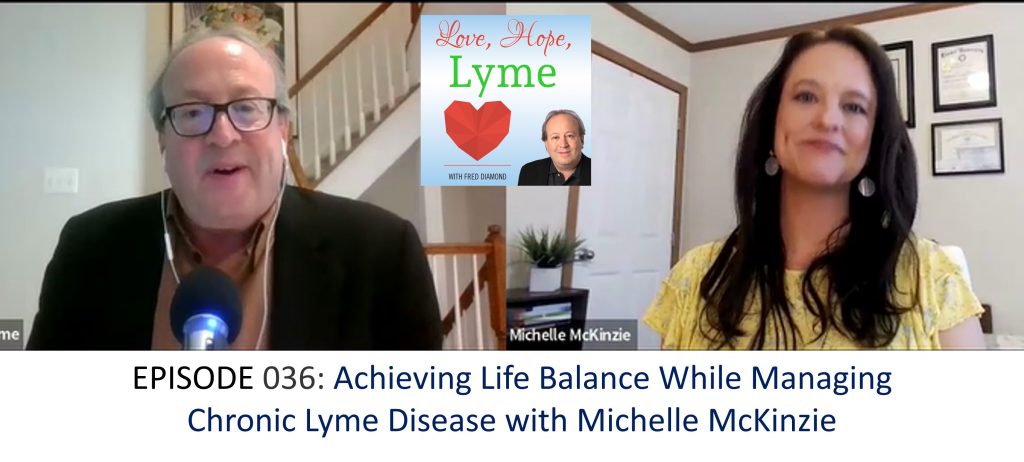PODCAST: Maintaining a career while managing chronic Lyme disease

By Fred Diamond
When I was researching my book “Love, Hope, Lyme: What Family Members, Partners, and Friends Who Love a Chronic Lyme Survivor Need to Know,” I was saddened to learn how difficult it could be for chronic Lyme survivors to have a successful career while managing treatment, symptoms, and personal care.
In this episode of the Love, Hope, Lyme podcast, I interview Michelle McKinzie, a licensed integrative therapist with specialized training in integrative medicine for mental health professionals.
She discusses how Lyme survivors can achieve life balance while managing a career and other life aspects. She also talks about ways Lyme survivors can maintain and grow their professional careers.
“I primarily support professional women grappling with chronic Lyme disease. My goal is to help them manage the overwhelming stress, isolation, and challenges that come with the disease so they can confidently advocate for themselves, boost their energy, and effectively navigate their medical treatments. When we address the mental, emotional, and even spiritual aspects of healing, we unlock the body’s potential to heal more quickly,” she said.
“I’m also a Lyme warrior myself and have been in remission for five years now. During that time, I’ve not only maintained my career but also launched a business, all while managing the complexities of this illness. I bring both my professional expertise and personal experience to the women I work with.”
Stress and its impact on health
I asked her how stress makes it more difficult to manage a balanced life, especially when you have a challenging job.
“Stress plays a critical role in our overall health. The more stress we endure, the more likely we are to experience physical ailments. Stress often manifests in the body as stomach aches, headaches, or a rapid heartbeat. Chronic stress keeps the body in a state of inflammation, which can trigger or exacerbate conditions like Lyme disease,” she said.
“Our immune systems can only handle so much before they become overwhelmed, allowing dormant conditions to resurface and flourish.”
She says managing stress is vital for healing. Rest and pacing are key components, as the body can’t handle stress without adequate rest. It’s crucial to be proactive in managing stress, building resilience through proper diet, exercise, supplements, medication, and sleep.
Socializing, practicing mindfulness, and maintaining a positive mindset also contribute to resilience.
In the moment, stress can be managed with grounding exercises, deep breathing, spending time in nature, or engaging in activities that bring calm and relaxation. Whether it’s a walk outside, time with pets, or enjoying hobbies, these practices help us stay grounded and manage stress effectively.
Michelle says she has embraced the “Lyme warrior” mentality, which she believes is empowering for many people.
“Viewing Lyme disease as a battle you have the strength to overcome can be incredibly motivating. Once you reach remission, it’s like winning a battle. You realize you’ve fought hard and survived. This mindset provides the mental strength and resilience needed to get through this challenging disease,” she says.
Disclosure and accommodations at work
We discussed in detail how to make the work environment conducive to managing health.
“Every situation is unique, but I think it’s important to disclose your health issues (with your employer) to secure the accommodations you need to perform at your best,” Michelle says.
She asserts that accommodations are a legal right, and informing your employer of your needs is within that right. However, given the controversy and stigma surrounding Lyme disease, it’s important to be cautious about disclosing it specifically. Some people might misunderstand or dismiss your experience.
Instead, you can keep it general by disclosing that you have health issues and requesting reasonable accommodations. For instance, you might ask for a flexible work schedule, the ability to work from home, or modifications to your duties. Simple adjustments, like having an ergonomic workstation or the ability to eat or drink at your desk, can make a significant difference.
Balancing career and health
“I see women in two main situations: those who have worked hard to build their careers and are determined not to give that up, and those who need to keep working out of financial necessity. Both scenarios are challenging, especially when dealing with a health issue like Lyme disease. However, both are possible with the right approach and support,” she says.
“Women can take control of their health by letting go of the need to control everything. Career-driven women are often very much in control of their lives, but when it comes to health, we need to allow ourselves to rest and ask for help. By managing emotions, acknowledging stress, and proactively taking the right steps, we can start to heal.
“Initially, many women focus on finding the right medication or treatment to get better, which is a common approach to many health conditions. However, Lyme disease is far more complex. Over time, many women realize that physical treatment alone isn’t enough, and they begin to explore a more holistic approach. Once they reach that point, they’re often eager to embrace everything that can help them heal.”
Mindfulness, acceptance and support in healing
“Mindfulness teaches us to accept our current circumstances, let go of the past, and focus on what we can control. Applying this to Lyme disease means acknowledging where you are now, even if it’s different from where you were yesterday,” she says.
“It’s important to recognize that your current state doesn’t have to be permanent. With the right resources, support, and a holistic approach, you can heal from this illness. It’s not a life sentence; you can overcome it.
“I absolutely believe that support is crucial. Whether it’s advocating for yourself at work, seeking the necessary accommodations, or ensuring your family understands your needs, having a solid support system is essential. It’s also important to pace yourself, giving your body the time it needs to rest and recover. This balance between career and health is possible, but it requires mindful management.
“Educating your family or loved ones about your illness is crucial. Involving them in doctor’s appointments and helping them understand your treatment protocols can make a significant difference. It’s also important to communicate your needs clearly, as things are very different now. You can’t juggle everything as you did before falling ill. Leaning on your family and partner more, delegating tasks, and allowing them to help you are all key aspects of managing life with Lyme disease.”
Click here to listen to all episodes of the Love, Hope, Lyme Podcast or on YouTube.
Fred Diamond is based in Fairfax, Virginia and can be contacted via Facebook. His popular book, “Love, Hope, Lyme: What Family Members, Partners, and Friends Who Love a Chronic Lyme Survivor Need to Know” is available on Amazon. The e-version of the book is always free to Lyme survivors. PM Fred on Facebook for your copy.





















We invite you to comment on our Facebook page.
Visit LymeDisease.org Facebook Page